英国工业革命论文
[经济类论文]论工业革命与英国资本主义制度的最终确立
![[经济类论文]论工业革命与英国资本主义制度的最终确立](https://img.taocdn.com/s3/m/333c71200a4c2e3f5727a5e9856a561252d3216b.png)
论工业革命与英国资本主义制度的最终确立一、前言1689年英国的光荣革命,宣告了资产阶级革命的胜利,这为资本主义的发展扫清障碍,生产力得到迅速发展,英国由此发生了工业革命。
工业革命提供了技术支持,而在英国资产阶级革命之前的商业革命则为资本主义的发展提供了资本,使得资本主义生产力突飞猛进,从而也引发了生产关系的变革。
因此英国工业革命不单是引发了经济变革,而且也引发了社会变革,并最终使英国确立了资本主义制度。
但是以往的研究多半只是关注一些微观方面的问题,比如,研究英国工业革命的市场条件,法制环境,家庭体制变迁等,而对于工业革命与资本主义制度两者关系这一宏观命题,则分析不多。
作者抛砖引玉,请教于同仁。
二、概念辨析:工业革命与资本主义制度的内涵外延(一)工业革命1884年汤因比的《工业革命演讲集》出版后,“工业革命”一词广泛流传,逐渐成为人们的习惯用语。
一百多年来,尽管史学界和经济学界有关工业革命的著作越来越多,研究的问题越来越深入。
但研究者即使对一些基本问题也很少形成共识,对于“什么是工业革命”这一问题往往也是在不同的角度有不同答案。
不同时代的学者关注工业革命的角度不同。
国内外学者把工业革命定义的研究分为社会变革学派、工业组织学派、宏观经济学派、技术学派、能源学派和消费学派。
社会变革学派认为工业革命就是人类历史上一次人与人之间经济交易方式的大变革;工业组织学派强调工厂结构和规模的变化,或者说工厂制度的兴起;宏观经济学派则重点分析了当时出现的一些宏观经济指标的变化;技术学派认为,技术变化是工业革命时期最根本的特征;而在能源消耗学派的眼里,能源利用方式和种类的变化是工业革命的核心;消费学派认为,社会再生产过程包含生产、流通、分配和消费四个基本方面。
消费是一切生产的目的,它使生产得以实现,创造新的生产需要。
消费在工业革命时期有两个主要作用,一是完成社会再生产过程,二是扩大生产需要,尤其是使服务业迅速发展起来。
高中历史小论文范文

高中历史小论文范文
内容:
工业革命是18世纪末至19世纪初在欧洲,尤其是英国发生的一场深刻的社会经济变革。
它不仅标志着人类从手工业时代向机器工业时代的过渡,也预示着西方资本主义的兴起与发展。
首先,工业革命的兴起与资本主义经济体系的建立密切相关。
在这一时期,随着商品经济的发展和市场的扩大,资本主义生产方式逐渐取代了封建主义的生产方式。
资本家通过投资工厂和机器,雇佣工人进行大规模生产,从而实现了生产效率的极大提升。
其次,工业革命推动了科技的飞速发展。
蒸汽机的发明和应用,不仅极大地提高了生产效率,也促进了交通运输业的发展,铁路和蒸汽船的出现,进一步扩大了市场范围,为资本主义经济的全球扩张奠定了基础。
再次,工业革命对劳动力市场产生了深远的影响。
随着工厂制度的建立,大量农民被迫离开土地,进入城市成为工人。
这不仅改变了社会结构,也引发了工人阶级的兴起,为后来的社会运动和政治变革埋下了伏笔。
最后,工业革命对全球经济格局产生了重大影响。
西方国家通过工业革命积累了巨大的经济优势,开始在全球范围内进行殖民扩张和商品输出,形成了以西方为中心的全球经济体系。
综上所述,工业革命是西方资本主义兴起与发展的重要标志,它不仅改变了生产方式,促进了科技进步,也重塑了社会结构和全球经济格
局。
这一历史事件对后世产生了深远的影响,值得我们深入研究和思考。
高考历史备战小论文:科技革命

高考历史备战小论文:科技革命【题目】(2022·云南师大附中高三阶段练习)阅读材料,完成下列要求。
材料根据上表提取准确历史信息,自拟论题,并结合所学世界近现代史知识加以论证。
( 要求:观点明确, 史论结合,论证充分)【参考答案】示例一:观点:工业革命将英国推上世界霸主地位。
论述:18世纪中期,工业革命首先在英国发生。
蒸汽机的运用促进了英国纺织、煤炭、冶金等近代机器工业的兴起和发展,推动了社会生产力的极大发展。
工业革命使英国率先完成了从农业社会向工业社会的转变,改变了英国的经济状况和国际地位,成为世界工厂。
在强大的经济实力、科技实力和军事实力的支撑下,英国先后打败法国等欧洲国家,征服了加拿大、印度等国家,成为19世纪世界最强大的资本主义帝国,掌握世界霸权。
结论:工业革命使英国的实力大大增强,是英国成为世界霸主的主要推动力。
示例二:观点:科技进步是近现代西方国家发展的主要动力。
论述:科技进步是近现代西方国家崛起的基础。
近代以来,英国、德国、美国等国都依靠强大的科技先后崛起。
18世纪中期,工业革命首先在英国发生,英国率先完成了从农业社会向工业社会的转变;工业革命是英国成为世界霸主的主要推动力。
19世纪中后期,第二次工业革命开始,德国抓住了第二次工业革命的机遇,很快站在了世界科技的前沿;第二次工业革命使德国用30多年时间超过英国,成为欧洲第一强国。
20世纪中期,美国成为全球科研和技术创新潮流的引领者;美国持续不断的重大发明大大增强了美国的经济实力和综合国力;美国通过第三次科技革命成为资本主义超级大国。
结论:科技进步是近现代西方国家发展的不懈动力,是决定大国崛起的基石。
【解析】示例一:观点:根据材料“18世纪中期,英国率先开展工业革命,生产力迅速发展……自此掌握世界霸权”等信息,可拟定观点为:工业革命将英国推上世界霸主地位。
论述:根据材料并结合所学知识,从18世纪中期,工业革命首先在英国发生;蒸汽机的运用促进了英国纺织、煤炭、冶金等近代机器工业的兴起和发展,推动了社会生产力的极大发展;工业革命使英国率先完成了从农业社会向工业社会的转变,改变了英国的经济状况和国际地位,成为世界工厂;在强大的经济实力、科技实力和军事实力的支撑下,英国先后打败法国等欧洲国家,征服了加拿大、印度等国家,成为19世纪世界最强大的资本主义帝国,掌握世界霸权等方面基础论述。
工业革命历史小论文200字
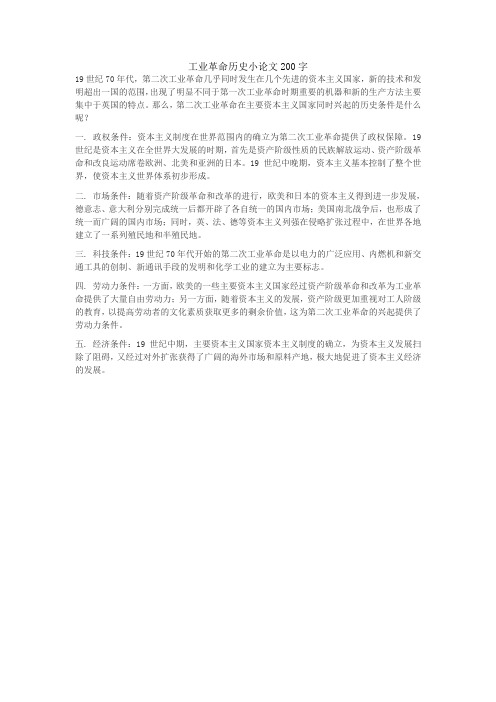
工业革命历史小论文200字
19世纪70年代,第二次工业革命几乎同时发生在几个先进的资本主义国家,新的技术和发明超出一国的范围,出现了明显不同于第一次工业革命时期重要的机器和新的生产方法主要集中于英国的特点。
那么,第二次工业革命在主要资本主义国家同时兴起的历史条件是什么呢?
一. 政权条件:资本主义制度在世界范围内的确立为第二次工业革命提供了政权保障。
19世纪是资本主义在全世界大发展的时期,首先是资产阶级性质的民族解放运动、资产阶级革命和改良运动席卷欧洲、北美和亚洲的日本。
19世纪中晚期,资本主义基本控制了整个世界,使资本主义世界体系初步形成。
二. 市场条件:随着资产阶级革命和改革的进行,欧美和日本的资本主义得到进一步发展,德意志、意大利分别完成统一后都开辟了各自统一的国内市场;美国南北战争后,也形成了统一而广阔的国内市场;同时,英、法、德等资本主义列强在侵略扩张过程中,在世界各地建立了一系列殖民地和半殖民地。
三. 科技条件:19世纪70年代开始的第二次工业革命是以电力的广泛应用、内燃机和新交通工具的创制、新通讯手段的发明和化学工业的建立为主要标志。
四. 劳动力条件:一方面,欧美的一些主要资本主义国家经过资产阶级革命和改革为工业革命提供了大量自由劳动力;另一方面,随着资本主义的发展,资产阶级更加重视对工人阶级的教育,以提高劳动者的文化素质获取更多的剩余价值,这为第二次工业革命的兴起提供了劳动力条件。
五. 经济条件:19世纪中期,主要资本主义国家资本主义制度的确立,为资本主义发展扫除了阻碍,又经过对外扩张获得了广阔的海外市场和原料产地,极大地促进了资本主义经济的发展。
工业发展的历史论文
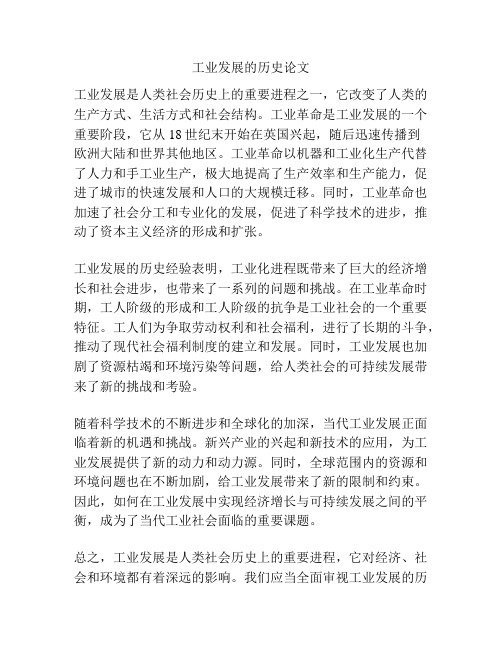
工业发展的历史论文工业发展是人类社会历史上的重要进程之一,它改变了人类的生产方式、生活方式和社会结构。
工业革命是工业发展的一个重要阶段,它从18世纪末开始在英国兴起,随后迅速传播到欧洲大陆和世界其他地区。
工业革命以机器和工业化生产代替了人力和手工业生产,极大地提高了生产效率和生产能力,促进了城市的快速发展和人口的大规模迁移。
同时,工业革命也加速了社会分工和专业化的发展,促进了科学技术的进步,推动了资本主义经济的形成和扩张。
工业发展的历史经验表明,工业化进程既带来了巨大的经济增长和社会进步,也带来了一系列的问题和挑战。
在工业革命时期,工人阶级的形成和工人阶级的抗争是工业社会的一个重要特征。
工人们为争取劳动权利和社会福利,进行了长期的斗争,推动了现代社会福利制度的建立和发展。
同时,工业发展也加剧了资源枯竭和环境污染等问题,给人类社会的可持续发展带来了新的挑战和考验。
随着科学技术的不断进步和全球化的加深,当代工业发展正面临着新的机遇和挑战。
新兴产业的兴起和新技术的应用,为工业发展提供了新的动力和动力源。
同时,全球范围内的资源和环境问题也在不断加剧,给工业发展带来了新的限制和约束。
因此,如何在工业发展中实现经济增长与可持续发展之间的平衡,成为了当代工业社会面临的重要课题。
总之,工业发展是人类社会历史上的重要进程,它对经济、社会和环境都有着深远的影响。
我们应当全面审视工业发展的历史经验,科学把握当代工业发展面临的新机遇和挑战,积极推动工业发展朝着可持续、和谐和共赢的方向发展。
同时,随着科技的不断进步和全球化的加深,当代工业发展面临新的机遇和挑战。
新兴产业的兴起和新技术的运用,为工业发展注入了新的活力。
数字化、人工智能、物联网等新兴技术的广泛应用,正在推动着工业制造方式的革新和升级,提高了生产效率和质量,也为生产过程中节约能源、降低排放提供了新的可能。
另一方面,随着全球资源的日益枯竭和环境问题的不断加剧,工业发展也面临着新的限制和挑战。
工业革命推动交通运输业的历史小作文
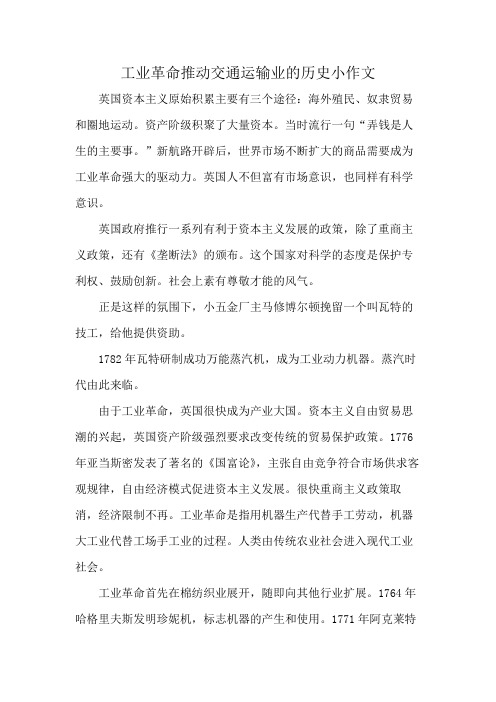
工业革命推动交通运输业的历史小作文英国资本主义原始积累主要有三个途径:海外殖民、奴隶贸易和圈地运动。
资产阶级积聚了大量资本。
当时流行一句“弄钱是人生的主要事。
”新航路开辟后,世界市场不断扩大的商品需要成为工业革命强大的驱动力。
英国人不但富有市场意识,也同样有科学意识。
英国政府推行一系列有利于资本主义发展的政策,除了重商主义政策,还有《垄断法》的颁布。
这个国家对科学的态度是保护专利权、鼓励创新。
社会上素有尊敬才能的风气。
正是这样的氛围下,小五金厂主马修博尔顿挽留一个叫瓦特的技工,给他提供资助。
1782年瓦特研制成功万能蒸汽机,成为工业动力机器。
蒸汽时代由此来临。
由于工业革命,英国很快成为产业大国。
资本主义自由贸易思潮的兴起,英国资产阶级强烈要求改变传统的贸易保护政策。
1776年亚当斯密发表了著名的《国富论》,主张自由竞争符合市场供求客观规律,自由经济模式促进资本主义发展。
很快重商主义政策取消,经济限制不再。
工业革命是指用机器生产代替手工劳动,机器大工业代替工场手工业的过程。
人类由传统农业社会进入现代工业社会。
工业革命首先在棉纺织业展开,随即向其他行业扩展。
1764年哈格里夫斯发明珍妮机,标志机器的产生和使用。
1771年阿克莱特建立第一个水力纺纱厂,标志现代工厂的诞生。
对新能源、新材料的需求催进钢铁业和煤炭业的发展,随即带动交通运输业。
美国的富尔顿发明汽船,英国斯蒂芬孙发明蒸汽机车。
最终,机器制造机器的机器制造业的出现,说明以蒸汽机、煤炭、钢铁为中心的工业革命基本完成。
在经济角度看来,英国工业革命创造巨大生产力,英国成为名副其实的世界工厂。
在产业结构来看,英国率先由传统农业社会转变为工业社会,产业结构产生重大变化,农业在国民经济中比例不断减小,工业和服务业比例持续上升。
社会结构和阶级变化方面,贵族、乡绅的社会影响力不断下降,农民人数减少,新兴资本家地位独断上升,产业工人的队伍不断壮大。
工业革命造成阶级关系的深刻变化,资本和劳动成为主要社会关系,近代工业资产阶级和工人阶级成为社会发展的主导力量。
工业发展的历史论文怎么写
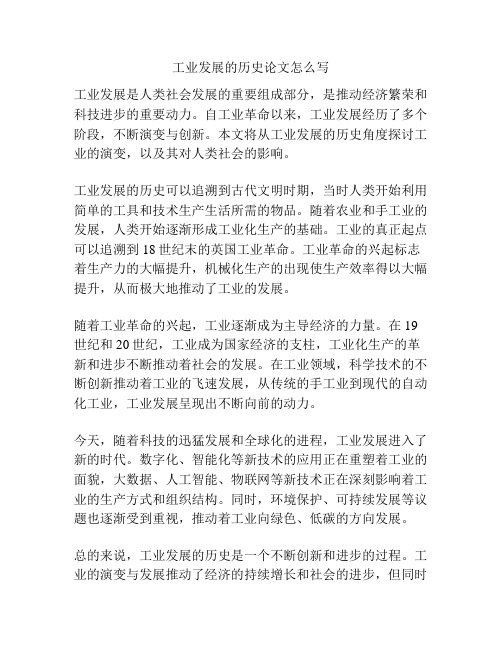
工业发展的历史论文怎么写
工业发展是人类社会发展的重要组成部分,是推动经济繁荣和科技进步的重要动力。
自工业革命以来,工业发展经历了多个阶段,不断演变与创新。
本文将从工业发展的历史角度探讨工业的演变,以及其对人类社会的影响。
工业发展的历史可以追溯到古代文明时期,当时人类开始利用简单的工具和技术生产生活所需的物品。
随着农业和手工业的发展,人类开始逐渐形成工业化生产的基础。
工业的真正起点可以追溯到18世纪末的英国工业革命。
工业革命的兴起标志着生产力的大幅提升,机械化生产的出现使生产效率得以大幅提升,从而极大地推动了工业的发展。
随着工业革命的兴起,工业逐渐成为主导经济的力量。
在19世纪和20世纪,工业成为国家经济的支柱,工业化生产的革新和进步不断推动着社会的发展。
在工业领域,科学技术的不断创新推动着工业的飞速发展,从传统的手工业到现代的自动化工业,工业发展呈现出不断向前的动力。
今天,随着科技的迅猛发展和全球化的进程,工业发展进入了新的时代。
数字化、智能化等新技术的应用正在重塑着工业的面貌,大数据、人工智能、物联网等新技术正在深刻影响着工业的生产方式和组织结构。
同时,环境保护、可持续发展等议题也逐渐受到重视,推动着工业向绿色、低碳的方向发展。
总的来说,工业发展的历史是一个不断创新和进步的过程。
工业的演变与发展推动了经济的持续增长和社会的进步,但同时
也带来了一系列的挑战和问题。
在未来的发展中,需要更加关注技术创新、环境保护和社会可持续发展的平衡,促进工业发展与社会进步的和谐发展。
形势与政策论文
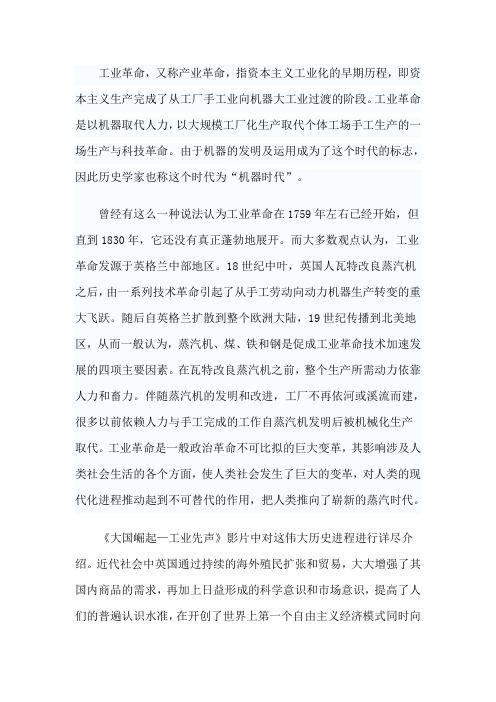
工业革命,又称产业革命,指资本主义工业化的早期历程,即资本主义生产完成了从工厂手工业向机器大工业过渡的阶段。
工业革命是以机器取代人力,以大规模工厂化生产取代个体工场手工生产的一场生产与科技革命。
由于机器的发明及运用成为了这个时代的标志,因此历史学家也称这个时代为“机器时代”。
曾经有这么一种说法认为工业革命在1759年左右已经开始,但直到1830年,它还没有真正蓬勃地展开。
而大多数观点认为,工业革命发源于英格兰中部地区。
18世纪中叶,英国人瓦特改良蒸汽机之后,由一系列技术革命引起了从手工劳动向动力机器生产转变的重大飞跃。
随后自英格兰扩散到整个欧洲大陆,19世纪传播到北美地区,从而一般认为,蒸汽机、煤、铁和钢是促成工业革命技术加速发展的四项主要因素。
在瓦特改良蒸汽机之前,整个生产所需动力依靠人力和畜力。
伴随蒸汽机的发明和改进,工厂不再依河或溪流而建,很多以前依赖人力与手工完成的工作自蒸汽机发明后被机械化生产取代。
工业革命是一般政治革命不可比拟的巨大变革,其影响涉及人类社会生活的各个方面,使人类社会发生了巨大的变革,对人类的现代化进程推动起到不可替代的作用,把人类推向了崭新的蒸汽时代。
《大国崛起—工业先声》影片中对这伟大历史进程进行详尽介绍。
近代社会中英国通过持续的海外殖民扩张和贸易,大大增强了其国内商品的需求,再加上日益形成的科学意识和市场意识,提高了人们的普遍认识水准,在开创了世界上第一个自由主义经济模式同时向工业化国家迈进这为第一次工业革命的爆发埋下伏笔,而在这一系列历史变化进程中,一些重要的历史人物在其中扮演着不可替代的角色。
1687年艾萨克·牛顿发表了《自然哲学的数学原理》,其中阐述万有引力定律和运动三大定律等自然规律,科学的精神渗透到英国人民心中,求知欲让人们脱离神的束缚开始迈向新的生活。
马修·博尔顿和瓦特一个乐观向上一个深思熟虑,因为工业发展而走到一起。
他们的联手最终以万能蒸汽机解决了核心动力问题,英国工业化全速开展。
工业革命历史小论文初三

工业革命历史小论文初三
我认为工业革命是一把双刃剑,有利也有弊。
自从1765年瓦特改进“蒸
汽机”开始,工业革命便以它为动力开始了革命。
机械的生产会伴随着废气的
排放和水资源的污染,即使它给人们带来了金钱,但那也是穷人越穷,富人越富。
但是工业革命使欧派社会进行了翻天覆地的变化,并且逐步确立了资产阶
级对世界的统治,还极大地解放了人们的劳动力。
所以说,我们要合理运用科
技成果,化弊为利,并且要学习科学家勇于探索的精神。
首先使生产力大大提高,巩固了资产阶级的统治地位;促进了美、俄、德、意的革命、改革,使资本主义世界体系初步形成;在工业社会中日益分裂为两
大对立阶级--工业资产阶级和工业无产阶级,19世纪30、40年代,工人运动兴起;开始了城市化的进程;先进的生产方式和技术传播到各地,冲击着旧制度、旧思想;东方从属于西方,殖民侵略导致了民族解放运动高涨。
弊:在第一次工业革命时期,许多技术发明都来源于工匠的实践经验,科学和技术尚未真正结合;重要的新机器和新生产方法主要是在英国发明的,其他国家工业革
命发展相对缓慢。
总结第一次工业革命的影响 1、生产组织形式:机器生产代替手工劳动,工厂制度兴起。
极大地提高了生产力,巩固了资本主义各国的统治基础,资本主义生产制度最终取得了统治地位。
2、阶级关系:引起社会结构的重大变化,形成工业资产阶级和无产阶级。
3、生活方式:开始了城市化的进程,丰富了人们的日常生活。
4、世界市场:改变了世界面貌,密切了各地联系,世界市场初步形成。
工业革命论文报告摘要
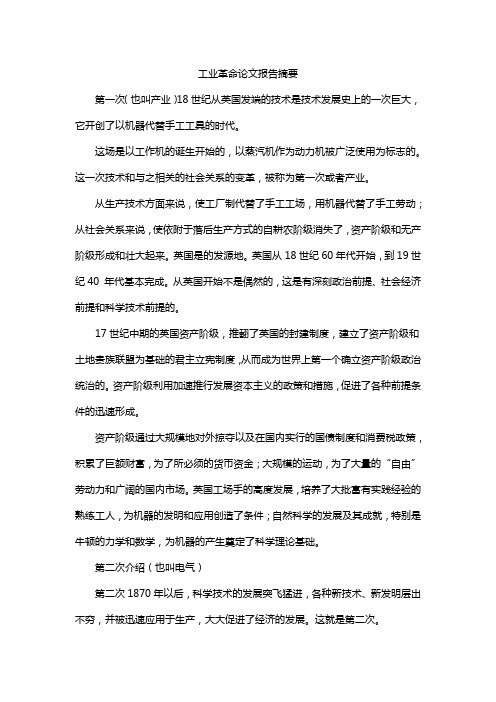
工业革命论文报告摘要第一次(也叫产业)18世纪从英国发端的技术是技术发展史上的一次巨大,它开创了以机器代替手工工具的时代。
这场是以工作机的诞生开始的,以蒸汽机作为动力机被广泛使用为标志的。
这一次技术和与之相关的社会关系的变革,被称为第一次或者产业。
从生产技术方面来说,使工厂制代替了手工工场,用机器代替了手工劳动;从社会关系来说,使依附于落后生产方式的自耕农阶级消失了,资产阶级和无产阶级形成和壮大起来。
英国是的发源地。
英国从18世纪60年代开始,到19世纪40 年代基本完成。
从英国开始不是偶然的,这是有深刻政治前提、社会经济前提和科学技术前提的。
17世纪中期的英国资产阶级,推翻了英国的封建制度,建立了资产阶级和土地贵族联盟为基础的君主立宪制度,从而成为世界上第一个确立资产阶级政治统治的。
资产阶级利用加速推行发展资本主义的政策和措施,促进了各种前提条件的迅速形成。
资产阶级通过大规模地对外掠夺以及在国内实行的国债制度和消费税政策,积累了巨额财富,为了所必须的货币资金;大规模的运动,为了大量的“自由”劳动力和广阔的国内市场。
英国工场手的高度发展,培养了大批富有实践经验的熟练工人,为机器的发明和应用创造了条件;自然科学的发展及其成就,特别是牛顿的力学和数学,为机器的产生奠定了科学理论基础。
第二次介绍(也叫电气)第二次1870年以后,科学技术的发展突飞猛进,各种新技术、新发明层出不穷,并被迅速应用于生产,大大促进了经济的发展。
这就是第二次。
当时,科学技术的突出发展主要表现在三个方面,即电力的广泛应用、内燃机和新交通工具的创制、新通讯手段的发明。
第二次以电力的广泛应用为显著特点。
从19世纪六七十年代开始,出现了一系列电气发明。
德国人西门子制成发电机,比利时人格拉姆发明电动机,电力开始用于带动机器,成为补充和取代蒸汽动力的新能源。
电力和电器业迅速发展起来。
人类跨入了电气时代。
19世纪早期,人们发现了电磁感应现象,根据这一现象,对电作了深入的研究。
历史的论文 两次工业革命的异同800字

历史的论文两次工业革命的异同800字两次工业革命相比特点⑴:第一次工业革命:①许多技术发明都来源于工匠的实践经验。
②科学和技术尚未真正结合。
第二次工业革命:①自然科学的新发展,开始同工业生产紧密地结合,推动了生产力发展。
②科学与技术结合取得了巨大成果,体现了科学就是生产力。
特点⑵第一次工业革命:①首先发生于英国。
②其他国家工业革命的发展进程相对缓慢。
第二次工业革命:①几乎同时发生在几个先进的资本主义国家。
②规模更加广泛,发展比较迅速。
特点⑶对没有完成第一次工业革命的国家来说,两次工业革命是交叉进行的。
所以这些国家的经济发展速度比较快。
如日本,俄国。
另一种比较首先比较两次工业革命的前提的异同。
一种新的社会制度的确立需要一种新的生产方式与之相适应并为之服务,而当这种新的生产方式适应了新的社会制度,则使新生的社会制度更加巩固和发展了,从而深刻理解生产力与生产关系之间的辩证关系。
其次比较两次工业革命的条件的异同。
工业革命是一场伟大的生产关系革命,它的进行需要一定的资金、市场、劳动力和技术等条件。
资金方面:在资金积累方面主要资本主义国家都在自觉或不自觉中为工业革命做着准备,这就是它们的相同之处。
而他们的不同之处则在于:第二次工业革命的资金准备是以第一次工业革命的成果或影响为基础的。
市场和劳动力方面:资本主义世界市场已在十九世纪五六十年代形成,殖民国家所拥有的市场范围和劳动力都已比第一次工业革命前大大扩大了。
通过上面的分析学生们很容易得出结论:正是由于生产无法满足日益扩大的市场的需求,因而要求在生产方面进行一场新的革命,这就是他们的共同点;两次工业革命在市场和劳动力方面的区别则是市场范围和劳动力的数量的差别。
技术方面:相同点是生产技术的不断创新与进步,并得到政府的支持。
不同点则是第一次工业革命的技术来源于生产的实践和经验的总结,而第二次工业革命的技术则来源于自然科学知识的进步。
第三,比较两次工业革命的特点。
英国工业革命 论文

UK’s industrial revolution张明敏应用英语学院2013级2班Part one:introduction of UK’s industrial revolutionMore than one hundred years, historians carried on the thorough research to the industrial revolution and economics, but what exactly is an industrial revolution often tell people.Scholars disagree on the existence of the industrial revolution in the history,even admit that the industrial revolution is a big economic reforms, also conducted a gradual theory and mutation theory. Mantoux, make a thorough inquiry of the original concept of the industry revolution.He points out that Marx referred to in the "industrial revolution"in Das Kapital.And then, "industrial revolution" in 1850, have been used by Andre Malraux.Even in 1845, it has been used in the?British?Working?Class of Engels.And here,the definition of it is that the industrial revolution is a period from the 18th to the 19th century where major changes in agriculture, manufacturing, mining, transport, and technology had a tremendous effect on the social economic and cultural conditions starting in the Great Britain,then subsequently spreading throughout Europe, North America, and eventually the world.Part two:The influence of UK’s industrial revolutionThe UK’s Revolution brought about dramatic changes in nearly every aspect of British society, including economy, politics, social structures and institutions.First, The Industrial Revolution had made Great Britain the wealthiest country in the world. Its Industrial productivity increased dramatically. Thus, Great Britain became the most advancedindustrial country and also the financial center in the world. As Britain’s incoming finances grew and increased, citizens were able to move up the rungs of the social class ladder in British society, thus improving their financial and educational statuses. Alongside new inventions came exciting discoveries in medicine, providing for better treatments of diseases and thus promoting the overall health of British society. Meanwhile, in Britain, roads made of longer-lasting surfaces and canals connected all parts of the nation. A mining engineer, George Stephenson, developed the first steam-powered locomotive, opening the way for the building of railroads. Railroads and steam-powered ships improved transportation around the world. In 1837, an American inventor, Samuel F.B. Morse, devised the telegraph, which revolutionized communications. In a word, all these new inventions made people’s life more convenient.Second,with the growth of factories, people were drawn tometropolitan centers.This result in an increase in population and urbanization. By 1850, the urban population was half of the whole population in Britain. The country also underwent a process of mass urbanization. Many new cities sprang up, such as Manchester, Leeds, Birmingham and Sheffield.Third, The Industrial Revolution also created changes in class structure. The capitalist class replaced the old nobility as the most important force in the country. Meanwhile, a large proletariat class came into being, who owned neither the means of production nor the products.The Industrial Revolution had its good side. But there was a saying that every coin has two sides. Obviously, The Industrial Revolution also had its bad side.Due to the factory system was largely responsible for the rise of the modern city, as large numbers of workers migrated into the cities in search of employment in the factories. In the largenumber of workers, there was a particular worker group, the child labours. They were forced to work in relatively bad conditions for much lower pay than their elders. There once was reported that, children as young as four were employed. Beatings and long hours were common, with some child coal miners working from 4 am until 5 pm. Conditions were dangerous, with some children were severely injured and sometimes killed when they dozed off and fell into the path of the carts, while others died from gas explosions. Many children developed lung cancer and other diseases and died before the age of 25.At the same time, Industrialization has brought factory pollutants and greater land use, which have harmed the natural environment. In particular, the application of machinery and science to agriculture has led to greater land use and, therefore, extensive loss of habitat for animals and plants. In addition, Industrialization and urbanization have also created some new social problems. For example: divide between rich and poor, overcrowding, living conditions were unsanitary, as well as cramped and impoverished and other defects.Part three:Revelation that China can drew from the UK’s industrial revolutionBritain's industrial revolution directly affects the process of human society, it provides a good reference for the development of our country. In according with?researching, revelation as follows. Ⅰ. Solve the problem of migrant workers and ensure the necessary social welfare in terms of employmentIn the early stage of the enclosure movement, with a large number of rural laborers into cities, it appears that a large number of unemployed are homeless because it was beyond the absorbing ability of cities.It influenced the urban security seriously. ( it also appears in China Guangzhou and other places now ), Therefore, the British government had killed plenty of homeless farmers.Butconspicuously, it is those people that provides the most scarce resources for the industrial revolution.On the one hand,officials in coastal cities now complain the migrant workers problem, on the other hand,they are badly in need?of labor.Migrant workers have played and are still playing an important role in China's industrialization and urbanization, but they lack necessary social welfare in terms of employment and retirement benefits compared with urban workers. Migrant workers face many difficulties at work, such as backbreaking work, high health risks,weak social welfare and social security, as well as poor protection of rights. These people have made great contributions and sacrifices on the road to China's fast-paced economic development and transformation.Therefore, they deserve part of the economic benefits.The least the authorities could do is to end the differential treatment of urban and rural residents. This is an issue they cannot afford to ignore if they want to ensure China's sustainable development, including urbanization and economic transformation.Ⅱ. Adjust population structure problem reasonably.The development of British industrial revolution attributed to the new increase of young labor rather than the Middle-aged labor or senior migrant workers .Since the middle of the 18th century, The population of UK has increased by three times. It means that there are abundant labor.As a matter of fact, any country industrialization process count on the new increase of young labor.Industrialization is a process of accumulation.For quite some time,China became the “factory of the world”thanks to abundant supplies of cheap labor.With China's growing aging population, many people in rural areas are becoming old before becoming well off,so it means that the basic new Labor force is not enough,which cannot satisfy the process of industrialization in China.In other words, the shortage of migrant workers appears.Demographic structure problems makes China industrialized or lag in a deform and risky path.Ⅲ.Independent innovation is the key to the industrialization.Explosions of technology and system innovation appeared in the process of the UK’s industrial revolution .They are all originated in folk,and mostly made by young people.Although China is a country with a population of 1.3 billion,people in China is mostly farmers, who are not connected with innovation.They are mostly in low technology level in China's urban population while in the18th century of UK’s industrial revolution ,ordinary workers is sufficient to theinnovation?in?products?and?in?technology.Now UK is facing the fourth and the fifth industrial revolution so the requirements of innovative personnel quality greatly improved, the real conditions of high technological innovation personnel far less than the United States.For quite some time, “made in China”has been synonymous with cheap and inferior quality goods. As one Chinese trade official said years ago, foreign trade had long been sewing shirts for overseas markets in exchange for airplanes.it indicates the absence of self-innovation capacity is the key factor which blocks Chinese industry getting self-development and sustaining competitive advantage.Our government should approach an understanding?of?reality?and?attaining?enlightenment.What China needs to do is improving the quality and steady adjustment of industrial structure.China must create a good?circumstance to enable more people into the innovation.Also,do encourage enterprises to innovation in a tolerant social environment.What’s more, strengthen the investment of human capital of entrepreneur.Entrepreneurs can learn the advanced management knowledge through the system to improve their own management, management ability, such as active participation in training, advanced study etc.(1396)ReferencePeter Mathial. The First Industrial Nation Routledge 3 (2001)Neil J. Smelser. Social Change in the Industrial Revolution Literary Licensing& LLC(2011)Clark Nardinelli. Child Labor and the Industrial Revolution Teachers Created Materials(2009) B. L. Hutchins﹠A. Harrison. A History of Factory Legislation Frank Cass Publisher(1966)Li?Renqing Give migrant workers their rightful due China Daily 2015-5-19(9)保尔.芒图十八世纪产业革命 [M] 北京中国商务出版社 1997卡尔·马克思资本论 [M] 北京人民出版社? 2004(第一卷)克拉潘现代英国经济史 [M] 北京商务印刷馆 2014恩格斯英国工人阶级的状况[M] 北京人民出版社 1956(第11,355页)穆勒政治经济学原理[M] 华夏出版社 2013(581页)。
工业革命对近代英国社会结构影响[论文]
![工业革命对近代英国社会结构影响[论文]](https://img.taocdn.com/s3/m/c277460ce87101f69e31953b.png)
工业革命对近代英国社会结构的影响摘要:工业革命对近代英国社会产生了重大影响。
通过对工业革命所引发的英国的社会结构变化,来更深刻地揭示生产力对生产关系的决定作用。
从而有所启发,推动我国社会,乃至整个人类社会更好的向前发展。
关键词:工业革命近代英国社会结构“工业革命”这个概念是由法国人首先提出来的,借用法国的政治革命,来比喻海峡对岸工业发生的变化。
此后,这个词在英法两个国家逐渐传播开来。
有人做了这样一个总结性的评论,工业革命至少具有双重意义。
它是普通意义上的革命,包肉眼所见的一切短时段变革。
它也是一个渐进的、不露声色的、往往难以辨认的长时段过程。
一、英国工业革命在英国,工业革命是首先从棉纺织业开始的,它最能体现工业革命的特点。
先进技术和现代工厂管理的结合,使纺织厂的效率飞速提高。
棉纺织业中涉及各个领域、各个工序的发明创造,也推动了经济的迅猛发展。
棉纺织品为私人企业家展现了一幅无比宏伟的蓝图,诱使他们大胆的进行工业革命。
而充分扩展的市场也需要这样的革命。
这样就引发了激烈的竞争,造成了纺织厂之间的变化很大,但又反过来促进了经济的发展。
由于技术的进步、炼铁工业的发展、运河铁路的修建,英国成为西欧煤炭生产大国。
煤炭生产既为蒸汽机提供了燃料,同时赖于蒸汽机产生的动力。
铁的革命主要表现在使用煤炭和焦炭炼铁、炼钢技术发展、蒸汽机的使用和铁材料广泛应用上。
这些英国的冶铁业迅速走向机械化和产业化。
从此,铁成为工业的最基本原材料。
不过,工业革命得以蓬勃发展的一个最为重要的因素是新动力机器的出现。
瓦特通过对纽科门机的改进,而发明的蒸汽机可以生产出完全受人控制的动力。
这不但提高了工作效率,还减轻了劳动强度。
它在生产力上的广泛应用带了了人类生产力的一次打飞跃。
工厂的建立不再受自然地理条件的限制,工厂集中在城市的过程由此开始。
农村大量剩余劳动力开始向进入工厂,涌入城市,因而加快了城市化的进程。
蒸汽机的出现和“铁器时代”的到来,为铁路运输和蒸汽机车的发明创造了条件。
高中历史论文范文
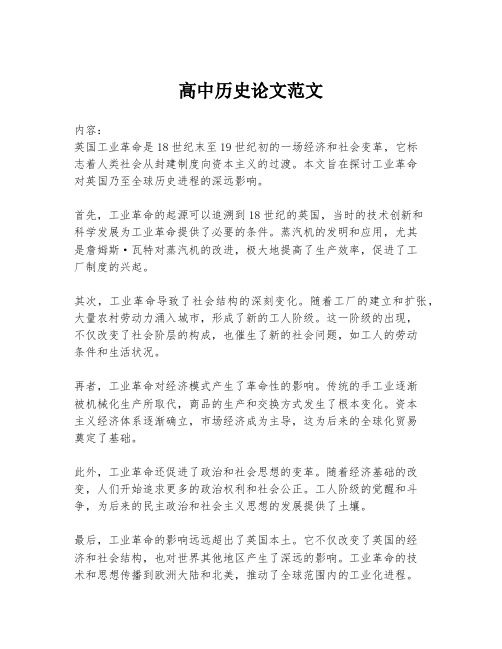
高中历史论文范文内容:英国工业革命是18世纪末至19世纪初的一场经济和社会变革,它标志着人类社会从封建制度向资本主义的过渡。
本文旨在探讨工业革命对英国乃至全球历史进程的深远影响。
首先,工业革命的起源可以追溯到18世纪的英国,当时的技术创新和科学发展为工业革命提供了必要的条件。
蒸汽机的发明和应用,尤其是詹姆斯·瓦特对蒸汽机的改进,极大地提高了生产效率,促进了工厂制度的兴起。
其次,工业革命导致了社会结构的深刻变化。
随着工厂的建立和扩张,大量农村劳动力涌入城市,形成了新的工人阶级。
这一阶级的出现,不仅改变了社会阶层的构成,也催生了新的社会问题,如工人的劳动条件和生活状况。
再者,工业革命对经济模式产生了革命性的影响。
传统的手工业逐渐被机械化生产所取代,商品的生产和交换方式发生了根本变化。
资本主义经济体系逐渐确立,市场经济成为主导,这为后来的全球化贸易奠定了基础。
此外,工业革命还促进了政治和社会思想的变革。
随着经济基础的改变,人们开始追求更多的政治权利和社会公正。
工人阶级的觉醒和斗争,为后来的民主政治和社会主义思想的发展提供了土壤。
最后,工业革命的影响远远超出了英国本土。
它不仅改变了英国的经济和社会结构,也对世界其他地区产生了深远的影响。
工业革命的技术和思想传播到欧洲大陆和北美,推动了全球范围内的工业化进程。
综上所述,英国工业革命是一场具有划时代意义的历史事件,它不仅改变了英国,也深刻影响了世界历史的进程。
通过对工业革命的深入分析,我们可以更好地理解现代社会的形成和发展。
第一次工业革命论文
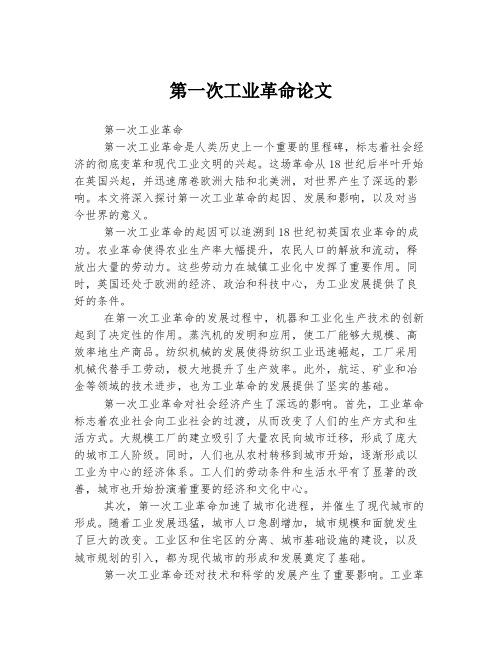
第一次工业革命论文第一次工业革命第一次工业革命是人类历史上一个重要的里程碑,标志着社会经济的彻底变革和现代工业文明的兴起。
这场革命从18世纪后半叶开始在英国兴起,并迅速席卷欧洲大陆和北美洲,对世界产生了深远的影响。
本文将深入探讨第一次工业革命的起因、发展和影响,以及对当今世界的意义。
第一次工业革命的起因可以追溯到18世纪初英国农业革命的成功。
农业革命使得农业生产率大幅提升,农民人口的解放和流动,释放出大量的劳动力。
这些劳动力在城镇工业化中发挥了重要作用。
同时,英国还处于欧洲的经济、政治和科技中心,为工业发展提供了良好的条件。
在第一次工业革命的发展过程中,机器和工业化生产技术的创新起到了决定性的作用。
蒸汽机的发明和应用,使工厂能够大规模、高效率地生产商品。
纺织机械的发展使得纺织工业迅速崛起,工厂采用机械代替手工劳动,极大地提升了生产效率。
此外,航运、矿业和冶金等领域的技术进步,也为工业革命的发展提供了坚实的基础。
第一次工业革命对社会经济产生了深远的影响。
首先,工业革命标志着农业社会向工业社会的过渡,从而改变了人们的生产方式和生活方式。
大规模工厂的建立吸引了大量农民向城市迁移,形成了庞大的城市工人阶级。
同时,人们也从农村转移到城市开始,逐渐形成以工业为中心的经济体系。
工人们的劳动条件和生活水平有了显著的改善,城市也开始扮演着重要的经济和文化中心。
其次,第一次工业革命加速了城市化进程,并催生了现代城市的形成。
随着工业发展迅猛,城市人口急剧增加,城市规模和面貌发生了巨大的改变。
工业区和住宅区的分离、城市基础设施的建设,以及城市规划的引入,都为现代城市的形成和发展奠定了基础。
第一次工业革命还对技术和科学的发展产生了重要影响。
工业革命时期,人们不断追求创新和技术进步。
科学和技术的快速发展为工业生产提供了丰富的资源和源泉。
并且,工业化的迅速推进也推动了科学和技术的进一步发展,形成了良性循环。
最后,第一次工业革命对全球范围的影响不可忽视。
英国历史论文

帝国迈出的巨大步伐——英国工业革命英国是工业革命最早的国家,是第一个全球金融资本的中心,他的发展与崛起令人叹为观止,是第一个真正意义上的世界超级大国,“日不落帝国”和“世界工厂”这两个称谓可以概括为英国最伟大的成就。
英国国土面积24.41万平方公里,是由不列颠岛(包括英格兰、苏格兰、威尔士)以及爱尔兰岛东北部的北爱尔兰和周围5500个小岛(海外领地)组成。
主要的矿产资源有煤、铁、石油和天然气,并不算很丰富。
那是什么将英国从一个岛国变成欧洲强国,最终成为世界霸主的呢?答案显而易见——工业革命。
发源于英国而后波及欧美主要国家的第一次工业革命,具有划时代的历史意义,对人类社会的演进产生了空前深刻、巨大的影响。
它为新生的资本主义制度奠定了坚实的物质基础,促使欧美诸国先后实现工业化,由农业国变成工业国。
它为英国提供了历史机遇,利用工业化先发优势,确立了“世界工厂”的地位。
工业革命给人类带来了进步和幸福,同时也使人类面临新的矛盾和挑战。
而马克思曾经说过:资本主义在它不到100年的时间里创造的生产力远远超过了以前几个世纪的总和。
严格来说,工业革命不能算上是真正的革命,它没有推翻任何的政权或阶级,只是属于社会、科技方面的急剧进步和发展。
革命背景:那么,这一次工业革命是如何产生的呢?首先,政治上,17 世纪的英国资产阶级革命,推翻了英国的封建专制制度,建立了资产阶级和土地贵族联盟为基础的君主立宪制度,从而成为世界上第一个确立资产阶级政治统治的国家。
资产阶级利用国家政权加速推行发展资本主义的政策和措施,促进了工业革命各种前提条件的迅速形成;思想上,亚当斯密在《国富论》提出的最著名的观点就是:看不见的手,也就是今天经济学家常常讲的市场供求规律。
他认为在市场经济中,个体间的自然交易会创造出高效的资源分配模式,并有利于促进市场经济,创造出更高水平的收入。
根据这个理论,亚当•斯密提出了一个影响深远的对外贸易战略。
所以,经济上,随着君主立宪制的与资本主义制度的建立,英国加速了圈地运动,殖民地掠夺与奴隶贸易,给英国带来了巨额的货币资本,从而为工业革命累积了财力上的准备。
论文:工业革命对世界经济的影响

工业革命对世界经济的影响学院:国际商学院班级:11级4班姓名:***学号:w*******内容摘要:18世纪下半叶和19世纪,在英国、法国、比利时、德国、美国等欧美先进国家首先发生了工业革命。
机器大工业的产生开辟了利用大自然赋予人类的丰富自然资源的广阔前景,这就使完成工业革命的国家产业结构发生根本变化,原来以农业为基础的农业社会转变为以工业为基础的工业社会。
这些国家的综合国力大为增强。
世界经济、科学文化、军事和政治的重心从亚洲古老文明国家转移到欧洲和北美,世界格局随之发生重大变化。
关键词:生产力、世界市场、工业化、殖民扩张一、生产力的一次巨大飞跃以机器取代手工工具,以蒸汽机、内燃机和电动机等动力机械取代人力、兽力、水力和风力,克服了人力兽力的局限性和自然力的不可遇见性及难以控制性,提高了人类利用自然和改造自然的能力,使生产力发生了巨大的飞跃。
采用机器仅仅是工业革命的一个方面,生产组织和管理的科学化对提高生产效率也起了重要作用。
把大量的机器和人力集中在工厂里,实现劳动分工的高度专业化;把生产过程中各个环节的机器合理地组成机器系统,形成生产流水线;科学地计算完成每道工序所需的劳动时间,合理地安排劳动力,最大限度地提高劳动生产率;实现产品元部件的专业化,增加可替换性,以便实现产品的专业化和规模化生产,降低成本,提高产品的耐用性,以上这些措施都促进了劳动生产率的提高。
由于工业化和城市化相伴发展,有充足的劳动力、动力和原材料供应,公用设施齐备,有利于发挥生产专业化和协作的优势及提高投资效益。
新材料的发现和发明对发展生产力的作用也是不可低估的。
冶金工业的技术进步,特别是钢铁工业的发展为工作机、工作母机、交通工具、建筑和日常生活提供了坚固耐用的基础材料,煤气制造、发电技术和石油提炼方法的发明为人类提供了新型热源和动力。
化学工业的发展使人工制造染料、肥料、药品和其他与人类生活有密切关系的产品成为可能。
二、全球交通网及世界市场的形成\在前工业社会,由于交通工具落后、旅行困难,世界各地区之间基本上处于隔绝状态,人员往来,文化和商品交流都不多。
50英镑上的工业革命

50英镑上的工业革命-历史论文50英镑上的工业革命文李容目前流通的50英镑,有2011年和1994年发行的新旧两个版本。
新版的背面头像是“工业革命先驱”瓦特与博尔顿,取代了旧版的英格兰银行首任行长约翰·霍布伦,这是英镑历史上第一次采用“双人像”。
他们吹响了工业茧命的号角,将人类推进了“蒸汽时代”,也打造了英国“世界工厂”的辉煌历史。
1970年发行的D系列的50英镑,其背面的人物是建筑师雷恩。
这位出身于宗教世家的建筑师,用45年时间设计建造了英国人民的精神标志——圣保罗大教堂,成为英国的另一个自豪。
瓦特与博尔顿工业革命双旗手“今天,很多国家的政界和商界名流都来到了新发动机试车现场。
伴随着震耳欲聋的轰鸣声,这台体积庞大的发动机开始高速运转起来,现场一片沸腾,先生们都对这台机器非常满意……”1776年,瓦特蒸汽机在布鲁姆菲尔德煤矿首次向公众展示其工作状态,詹姆斯·瓦特在试车当日的日记中用文字记录了现场情景。
从此,这台以每分钟18个冲程的速度运转的发动机,引发了一场对英国及全世界都具有划时代意义的工业革命。
其实,瓦特并非发明蒸汽机的第一人,而是在原有的纽科门蒸汽机的基础上不断改进,发明了新式的瓦特蒸汽机,使之成为真正的“万能的原动机”。
詹姆斯·瓦特,1736年1月19日出生于苏格兰的格里诺克,没有接受过系统教育,但自幼擅长手工艺,做过钟表店学徒工、仪器制造匠学徒工。
1764年,作为格拉斯哥大学的教具实验员,瓦特在修理纽科门蒸汽机时发现了它的两大缺点:活塞动作不连续而且慢;蒸汽利用率低,浪费原料。
1765年,瓦特产生了采用分离冷凝器的最初设想。
1769年,在第一位合伙人罗巴克的赞助下,瓦特制造出第一台分离冷凝器,获得了第一项专利。
然而,正如瓦特在回忆录中所说:“假如没有博尔顿的帮助,单靠我一个人的力量,我想这个发明恐怕不会有今天的成就。
”他认为“世人之所以能够广受蒸汽机的恩惠,全要归功于博尔顿对这项事业无比的关心和费心的经营,以及高明的远见。
- 1、下载文档前请自行甄别文档内容的完整性,平台不提供额外的编辑、内容补充、找答案等附加服务。
- 2、"仅部分预览"的文档,不可在线预览部分如存在完整性等问题,可反馈申请退款(可完整预览的文档不适用该条件!)。
- 3、如文档侵犯您的权益,请联系客服反馈,我们会尽快为您处理(人工客服工作时间:9:00-18:30)。
U K’s i n d u s t r i a l r e v o l u t i o n张明敏应用英语学院2013级2班3Part one:introduction of UK’s industrial revolutionMore than one hundred years, historians carried on the thorough research to the industrial revolution and economics, but what exactly is an industrial revolution often tell disagree on the existence of the industrial revolution in the history,even admit that the industrial revolution is a big economic reforms, also conducted a gradual theory and mutation theory. Mantoux, make a thorough inquiry of the original concept of the industry points out that Marx referred to in the "industrial revolution"in Das Kapital. And then, "industrial revolution" in 1850, have been used by Andre in 1845, it has been used in the?British?Working?Class of Engels.And here,the definition of it is that the industrial revolution is a period from the 18th to the 19th century where major changes in agriculture, manufacturing, mining, transport, and technology had a tremendous effect on the and conditions starting in the Britain,then subsequently spreading throughout Europe, North America, and eventually the world.Part two:The influence of UK’s industrial revolutionThe UK’s Revolution brought about dramatic changes in nearly every aspect of British society, including economy, politics, social structures and institutions.First, The Industrial Revolution had made Great Britain the wealthiest country in the world. Its Industrial productivity increased dramatically. Thus, Great Britain became the most advancedindustrial country and also the financial center in the world. As Britain’s incoming finances grew and increased, citizens were able to move up the rungs of the social class ladder in British society, thus improving their financial and educational statuses. Alongside new inventions came exciting discoveries in medicine, providing for better treatments of diseases and thus promoting the overall health of British society. Meanwhile, in Britain, roads made of longer-lasting surfaces and canals connected all parts of the nation. A mining engineer, George Stephenson, developed the first steam-powered locomotive, opening the way for the building of railroads. Railroads and steam-powered ships improved transportation around the world. In 1837, an American inventor, Samuel . Morse, devised the telegraph, which revolutionized communications. In a word, all these new inventions made people’s life more convenient.Second,with the growth of factories, people were drawn tometropolitan result in an increase in population and urbanization. By 1850, the urban population was half of the whole population in Britain. The country also underwent a process of mass urbanization. Many new cities sprang up, such as Manchester, Leeds, Birmingham and Sheffield.Third, The Industrial Revolution also created changes in class structure. The capitalist class replaced the old nobility as the most important force in the country. Meanwhile, a large proletariat class came into being, who owned neither the means of production nor the products.The Industrial Revolution had its good side. But there was a saying that every coin has two sides. Obviously, The Industrial Revolution also had its bad side.Due to the factory system was largely responsible for the rise of the modern , as large numbers of workers migrated into the cities in search of employment in the factories. In the large number ofworkers, there was a particular worker group, the s. They were forced to work in relatively bad conditions for much lower pay than their elders. There once was reported that, children as young as four were employed. Beatings and long hours were common, with some child coal miners working from 4 am until 5 pm. Conditions were dangerous, with some children were severely injured and sometimes killed when they dozed off and fell into the path of the carts, while others died from gas explosions. Many children developed and other diseases and died before the age of 25.At the same time, Industrialization has brought factory pollutants and greater land use, which have harmed the natural environment. In particular, the application of machinery and science to agriculture has led to greater land use and, therefore, extensive loss of habitat for animals and plants. In addition, Industrialization and urbanization have also created some new social problems. For example: divide between rich and poor, overcrowding, living conditions were unsanitary, as well as cramped and impoverished and other defects.Part three:Revelation that China can drew from the UK’s industrial revolutionBritain's industrial revolution directly affects the process of human society, it provides a good reference for the development of our country. In according with?researching, revelation as follows. Ⅰ. Solve the problem of migrant workers and ensure the necessary social welfare in terms of employmentIn the early stage of the enclosure movement, with a large number of rural laborers into cities, it appears that a large number of unemployed are homeless because it was beyond the absorbing ability of influenced the urban security seriously. ( it also appears in China Guangzhou and other places now ), Therefore, the British government had killed plenty of homeless conspicuously, it is those people that provides the most scarce resources for the industrial revolution.On the one hand,officials in coastal cities now complain the migrant workers problem, on the other hand,they are badly in need?of workers have played and are still playing an important role in China's industrialization and urbanization, but they lack necessary social welfare in terms of employment and retirement benefits compared with urban workers. Migrant workers face many difficulties at work, such as backbreaking work, high health risks,weak social welfare and social security, as well as poor protection of rights. These people have made great contributions and sacrifices on the road to China's fast-paced economic development and , they deserve part of the economic least the authorities could do is to end the differential treatment of urban and rural residents. This is an issue they cannot afford to ignore if they want to ensure China's sustainable development, including urbanization and economic transformation.Ⅱ. Adjust population structure problem reasonably.The development of British industrial revolution attributed to the new increase of young labor rather than the Middle-aged labor or senior migrant workers .Since the middle of the 18th century, The population of UK has increased by three times. It means that there are abundant labor.As a matter of fact, any country industrialization process count on the new increase of young is a process of quite some time,China became the “factory of the world”thanks to abundant supplies of cheap China's growing aging population, many people in rural areas are becoming old before becoming well off,so it means that the basic new Labor force is not enough,which cannot satisfy the process of industrialization in other words, the shortage of migrant workers structure problems makes China industrialized or lag in a deform and risky path.Ⅲ.Independent innovation is the key to the industrialization.Explosions of technology and system innovation appeared in the process of the UK’s industrialrevolution .They are all originated in folk,and mostly made by young China is a country with a population of billion,people in China is mostly farmers, who are not connected with are mostly in low technology level in China's urban population while in the 18th century of UK’s industrial revolution ,ordinary workers is sufficient to the innovation?in?products?and?in? UK is facing the fourth and the fifth industrial revolution so the requirements of innovative personnel quality greatly improved, the real conditions of high technological innovation personnel far less than the United States.For quite some time, “made in China”has been synonymous with cheap and inferior quality goods. As one Chinese trade official said years ago, foreign trade had long been sewing shirts for overseas markets in exchange for indicates the absence of self-innovation capacity is the key factor which blocks Chinese industry getting self-development and sustaining competitive government should approach an understanding?of?reality?and?attaining? China needs to do is improving the quality and steady adjustment of industrial must create a good?circumstance to enable more people into the ,do encourage enterprises to innovation in a tole rant social ’s more, strengthen the investment of human capital of can learn the advanced management knowledge through the system to improve their own management, management ability, such as active participation in training, advanced study etc.(1396)ReferencePeter Mathial. The First Industrial Nation Routledge 3 (2001)Neil J. Smelser. Social Change in the Industrial Revolution Literary Licensing& LLC(2011)Clark Nardinelli. Child Labor and the Industrial Revolution Teachers Created Materials(2009)B. L. Hutchins﹠A. Harrison. A History of Factory Legislation Frank Cass Publisher(1966)Li?Renqing Give migrant workers their rightful due China Daily 2015-5-19(9)保尔.芒图十八世纪产业革命 [M] 北京中国商务出版社 1997卡尔·马克思资本论 [M] 北京人民出版社? 2004(第一卷)克拉潘现代英国经济史 [M] 北京商务印刷馆 2014恩格斯英国工人阶级的状况[M] 北京人民出版社 1956(第11,355页)穆勒政治经济学原理[M] 华夏出版社 2013(581页)。
